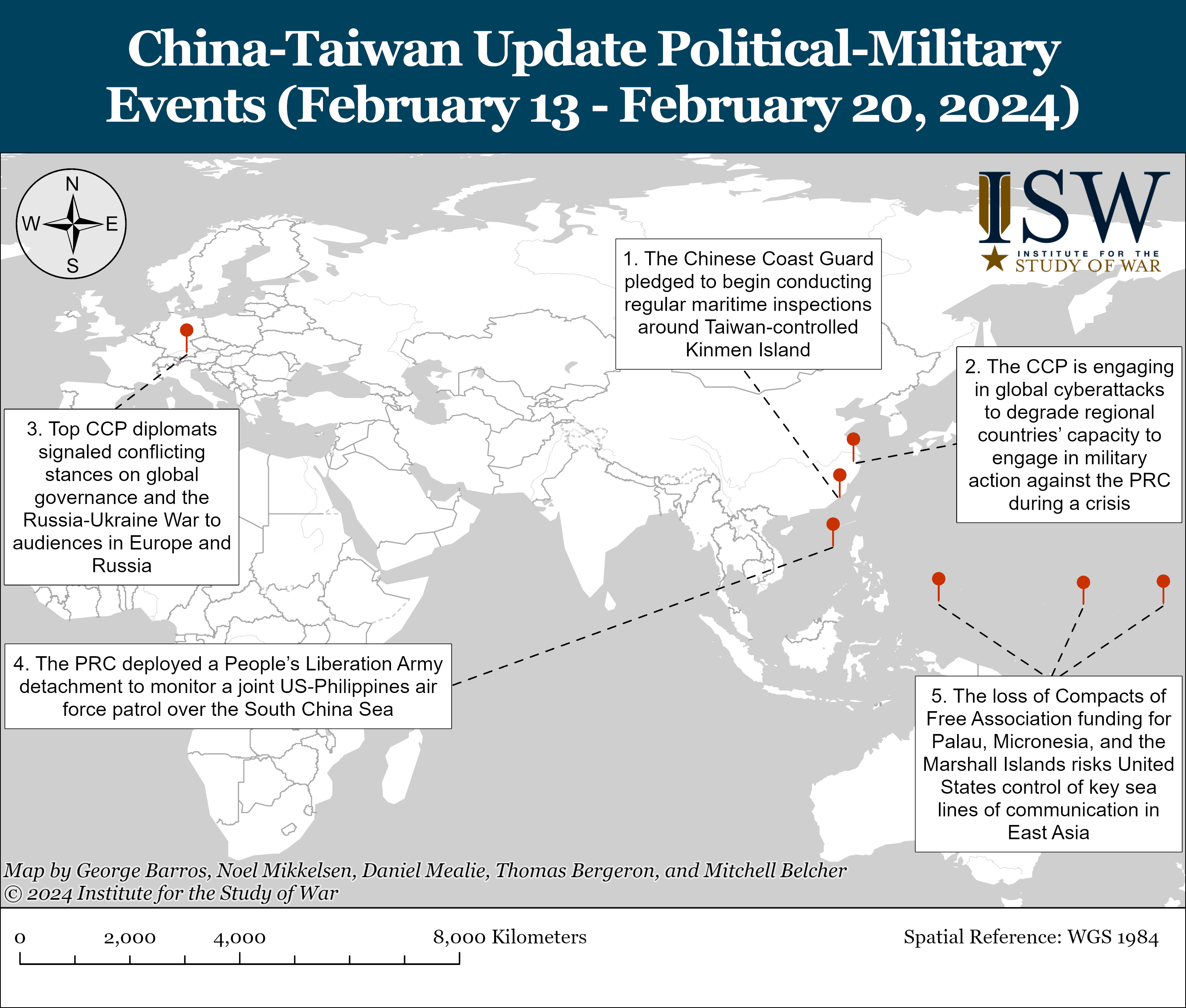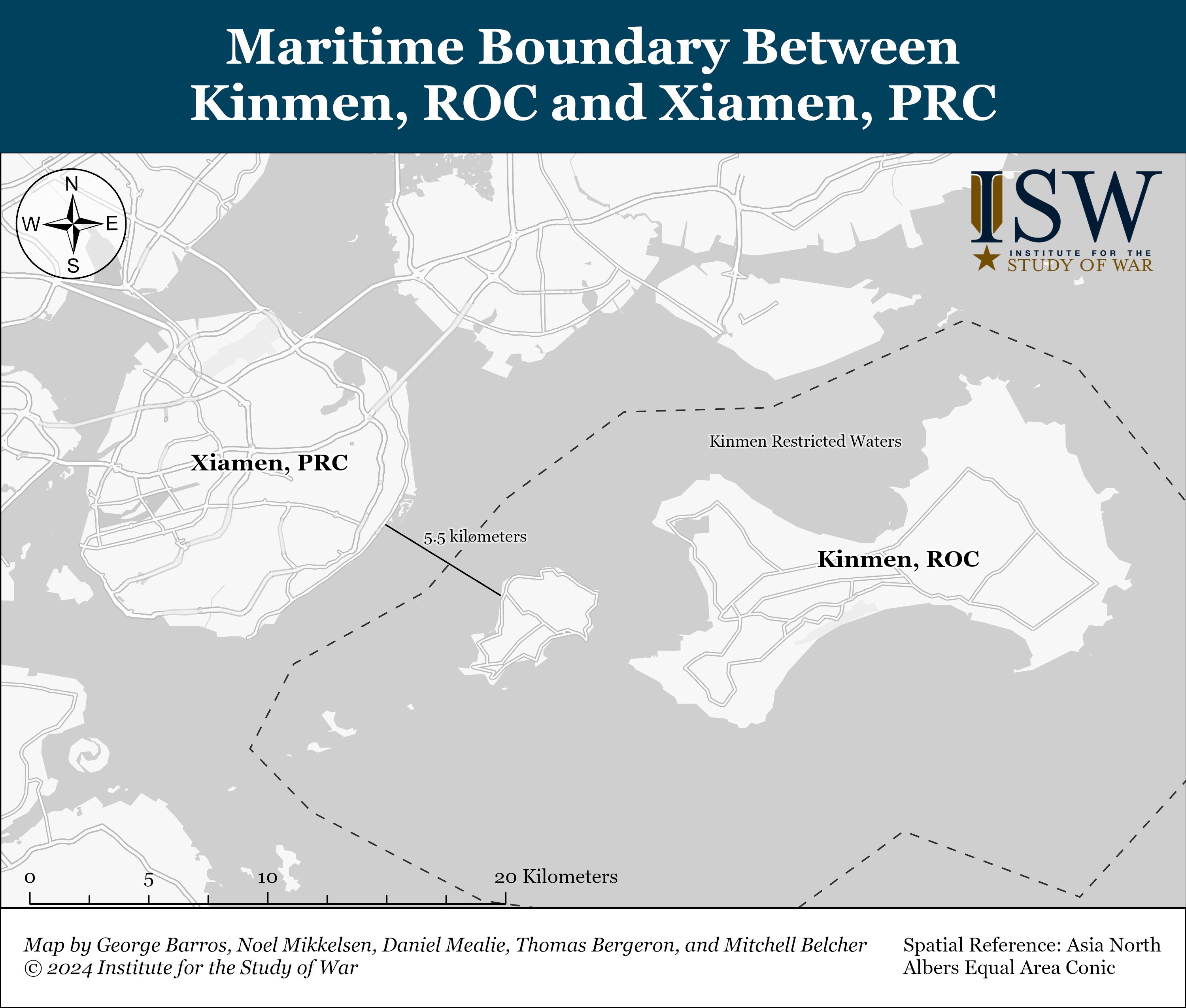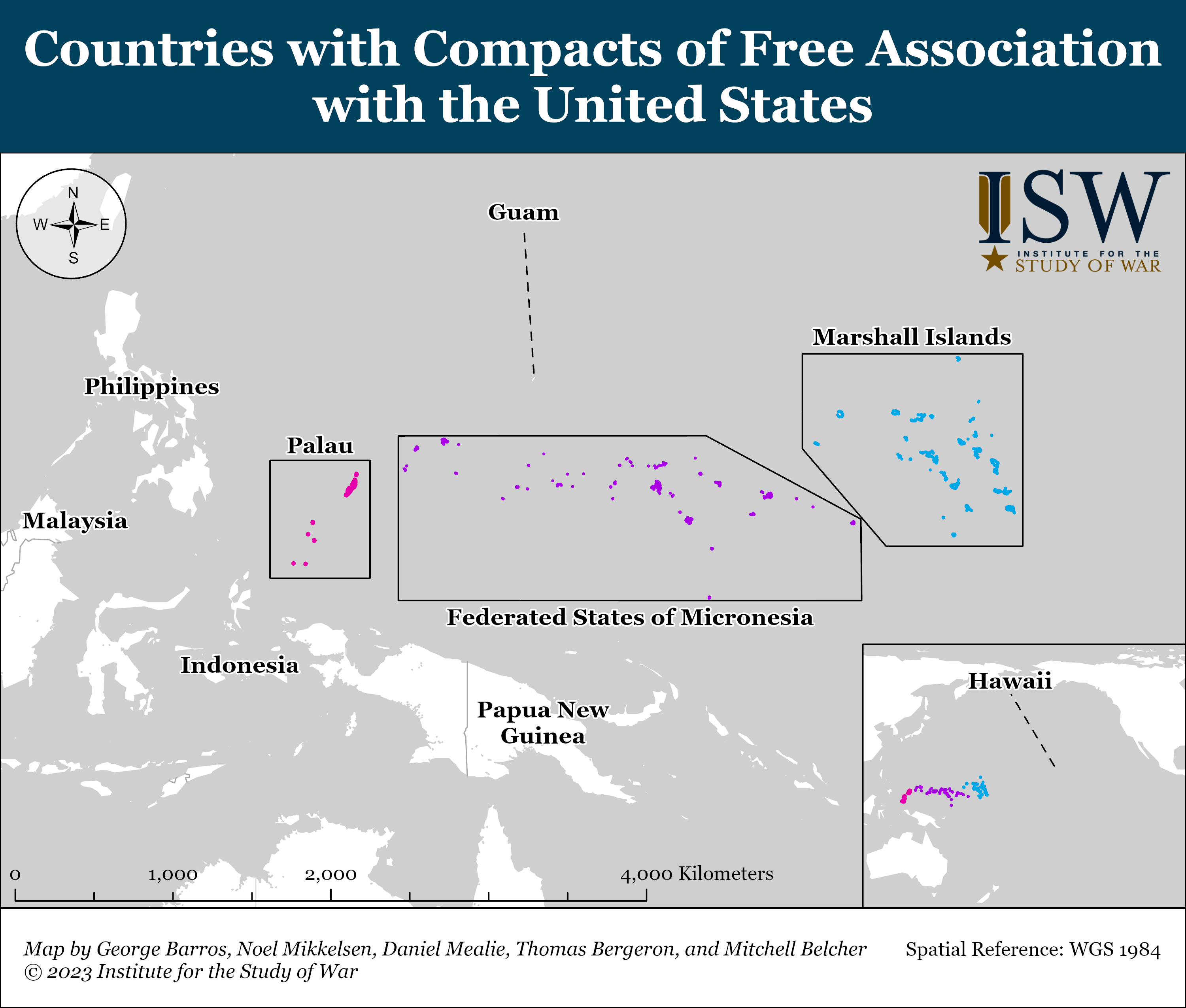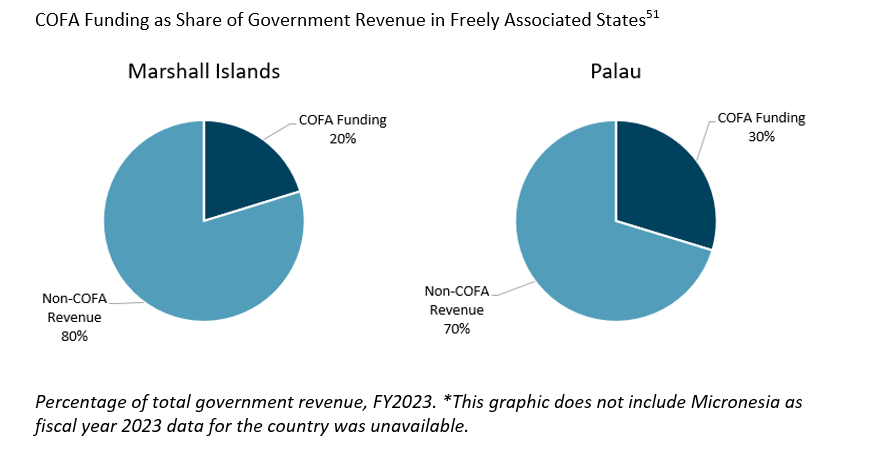China-Taiwan Weekly Update, February 23, 2024
Authors: Nils Peterson, Matthew Sperzel, and Daniel Shats of the Institute for the Study of War
Editors: Dan Blumenthal and Frederick W. Kagan of the American Enterprise Institute
Data Cutoff: February 21 at 5pm ET
The China–Taiwan Weekly Update focuses on the Chinese Communist Party’s paths to controlling Taiwan and relevant cross–Taiwan Strait developments.
Key Takeaways
- The Chinese Coast Guard (CCG) pledged to begin conducting regular maritime inspections around Taiwan-controlled Kinmen Island. Normalizing PRC maritime enforcement around the island will erode Taiwan’s control over its territorial waters and risk confrontations between the PRC and Taiwan’s maritime law enforcement.
- The CCP is engaging in global cyberattacks to degrade regional countries’ capacity to engage in military action against the PRC during a crisis. The cyberattacks could also facilitate actions against individuals who oppose the CCP.
- CCP International Department Head Liu Jianchao and PRC Foreign Minister Wang Yi gave conflicting stances on global governance and the Russia-Ukraine War at the “For Freedom of Nations” forum in Russia and the Munich Security Conference in Germany.
- Three of the PRC’s “Big Four” state banks stopped accepting payments from Western-sanctioned Russian financial institutions.
- The PRC deployed a People’s Liberation Army detachment to monitor a joint US-Philippines air force patrol over the South China Sea.
Cross-Strait Relations
Taiwan
The Chinese Coast Guard (CCG) pledged to begin conducting regular maritime inspections around Taiwan-controlled Kinmen Island. Normalizing PRC maritime enforcement around the island will erode Taiwan’s control over its territorial waters and risk confrontations between the PRC and Taiwan’s maritime law enforcement. Kinmen is a Taiwan-controlled island with a large military garrison roughly 3 kilometers from the coast of the PRC. The Taiwan Coast Guard Administration (CGA) enforces maritime laws around Kinmen and its lesser islands. An incident on February 14 that resulted in the death of two PRC nationals prompted the CCG to defy Taiwan’s sovereignty in the waters around its outer islands. A four-man PRC fishing boat intruded almost a mile into Taiwan’s territorial waters around Kinmen and capsized after colliding with a CGA ship while fleeing from a CGA inspection.[1] [2] The CGA was able to rescue only two of the fishermen, who returned to the PRC on February 20. CCG Spokesperson Gan Yu stated on February 18 that the CCG will strengthen law enforcement and conduct regular inspections in the waters around Kinmen and Xiamen, the nearby PRC city.[3] PRC Taiwan Affairs Office Spokesperson Zhu Fenglian refuted the existence of Taiwan’s territorial or restricted waters and stated that the PRC has the right to take “further measures,” and that Taiwan will “bear the consequences.”[4] Zhu also condemned Taiwan for its “brutal treatment of mainland fishermen” and disregard for human life.[5]
The CCG conducted its first maritime inspection in the Taiwan-controlled waters around Kinmen Island on February 19. CCG personnel boarded a Taiwanese sightseeing ship off the coast of the island. The personnel remained onboard for about 30 minutes, during which they inspected the ship’s voyage plan and registration. The CGA commented that this was the first CCG boarding of a Taiwanese vessel in Taiwan-controlled waters.[6] A CCG maritime surveillance ship entered Taiwan’s territorial waters south of Kinmen on February 20 and left an hour later.[7]
The CCG’s assertive behavior also extends to Taiwan’s other outer islands near the mainland. Three CCG ships entered the territorial waters around the Taiwan-controlled Matsu Islands on February 21.[8] The Matsu Islands are 10 kilometers off the mainland coast at their closest point and roughly 240 kilometers northeast of Kinmen Island.
A ROC official warned that the CCG may expand its operations into other Taiwan-controlled waters as well. KMT legislator Alex Tsai Cheng-yuan speculated on February 21 whether the Penghu Islands would be the next target for the CCG.[9] The Penghu Islands are located on the east side of the median line in the strait between the PRC and Taiwan, roughly 140 kilometers southeast of Kinmen Island. The islands hold strategic significance due to Taiwan’s robust military presence there and their ability to enable early detection and response to PRC military activities. The location of the islands in the Taiwan Strait makes them a valuable potential staging ground for the PRC to launch a future invasion of Taiwan.
The Kuomintang appointed two key legislators to oversee foreign and defense policy, which signals its determination to oppose the Democratic Progressive Party’s political agenda in these areas. Kuomintang (KMT) Caucus Whip Fu Kun-chi announced the party’s designation of Legislative Yuan Speaker Han Kuo-yu and Deputy Speaker Johnny Chiang Chi-chen to serve on the Foreign and National Defense Committee on February 21.[10] The Foreign and National Defense Committee is a legislative committee with the authority to conduct budget reviews, make recommendations to the Legislative Yuan (LY) based on its review of draft legislation, and summon officials from relevant agencies to respond to inquiries. The KMT and the ruling Democratic Progressive Party (DPP) hold divergent views on defense policy, with the former advocating for a comparatively modest approach that seeks to de-escalate tensions with Beijing. The KMT has consistently criticized President Tsai Ing-wen’s DPP administration for excessive defense spending.[11] The KMT’s appointment of its leading legislators to the committee suggests the party will focus considerable resources on shaping foreign and defense policy, making it one of the primary areas of competition in the LY. The KMT likely seeks to wield its influence in the committee to obstruct the DPP’s defense agenda, such as freezing budget appropriations and shaping policy proposals.
Fu declared in his announcement that there is nothing more important than imposing checks and balances on the DPP and stated that “Taiwan would not be well until the DPP falls.”[12] The KMT’s adversarial approach carries negative implications for President-elect Lai Ching-te, whose policy platform emphasizes stronger international relationships and national defense. The KMT’s determination to block the DPP’s political agenda is favorable to Chinese Communist Party (CCP) interests, especially if it hinders the government’s ability to implement its foreign and defense policy.
The Kuomintang and Taiwan People’s Party are pursuing political reforms that threaten to undermine the Democratic Progressive Party’s governance by entangling the party in defensive struggles. KMT and Taiwan People’s Party (TPP) party leaders discussed a joint proposal for “legislative and judicial reforms” in the Legislative Yuan on February 22.[13] TPP Caucus Whip Huang Kuo-chang stated that the two opposition parties maintain a close consensus on the issue.[14] The TPP and KMT have consistently stated that establishing a legislative investigative task force to strengthen oversight of the executive branch is at the top of their agenda.[15] KMT caucus Secretary-General Lin Tzu-ming earlier referred to the proposed mechanism as a “great weapon” that the Legislative Yuan must use to supervise the government.[16] Collaboration between the KMT and the TPP to introduce the proposals suggests the reforms will pass with a majority in the LY, as the TPP’s eight seats constitute a crucial swing vote. The opposition’s plan to impose checks and balances on the DPP could significantly hamper the government’s ability to pass policy by miring it in defensive actions against accusations of overstepping authority or corruption.
China
The CCP is engaging in global cyberattacks to degrade regional countries’ capacity to engage in military action against the PRC during a crisis. The cyberattacks could also facilitate actions against individuals who oppose the CCP. US and foreign partner cybersecurity and intelligence agencies confirmed in a joint advisory on February 7 that a PRC state-sponsored cyber threat actor known as Volt Typhoon infiltrated critical infrastructure organizations in the continental United States and US territories.[17] The authoring agencies assessed with high confidence that Volt Typhoon’s goal was to develop the capability to disrupt key operational technology functions in the event of a conflict with the United States by leveraging its access to informational technology environments. The cyber company I-Soon, which has contracts with the PRC Ministry of Public Security, Ministry of State Security, and People’s Liberation Army, subsequently leaked documents in late February that revealed additional CCP cyber operations. The targets of the operations include NATO, the Association of Southeast Asian Nations, Taiwan, South Korea, Vietnam, and India.[18] I-Soon also hacks X (formerly Twitter) accounts to uncover user identities.[19]
A February 13 report from the US security firm Trellix also shows a significant increase in cyberattacks against Taiwan during the 24 hours before its January 13 presidential election.[20] The report stated that the cyberattacks targeted a myriad of institutions such as governmental offices, police departments, and finance entities.[21] Trellix is reviewing the data but posited that PRC threat actors may have been responsible.[22]
The CCP refuted that it is responsible for the cyberattacks. The PRC Ministry of Foreign Affairs Spokeswoman Mao Ning refuted US FBI Director Christopher Wray’s statement that Chinese offensive malware is at an unprecedented high. Mao falsely claimed on February 22 that “China firmly opposes and combats all forms of cyberattacks.”[23]
United States and Europe
CCP International Department Head Liu Jianchao and PRC Foreign Minister Wang Yi gave conflicting stances on global governance and the Russia-Ukraine War at the “For Freedom of Nations” forum in Russia and the Munich Security Conference in Germany. “For Freedom of Nations” is a Russian forum of international political parties against “neo-colonialism” that Russia’s United Russia ruling party organized for the first time on February 15–16. It overlapped with the Munich Security Conference, which ran from February 16–18. Liu told the primarily Russian and Global South participants including former Russian president Dmitry Medvedev that the PRC advocated “reforming the global governance system,” among other things. [24] A joint statement claiming to represent the forum’s over 400 participants denounced “modern practices of neo-colonialism,” “selective application” of international law and a “rules-based world order,” and interference in other countries’ internal affairs.[25] These were thinly veiled attacks on the Western-led international order, which has been highly critical of both Russia and the PRC. Wang Yi presented an opposing view of PRC policies to the Western audience in Munich. He stated that the PRC is a “responsible major country” that would serve as a “stabilizing force” amid global turmoil. He said the PRC wished to “strengthen” global governance by upholding the authority of the United Nations and enhancing the voice of the Global South. Wang also portrayed the PRC as a stabilizing force in promoting cooperation between major world powers and in dealing with “hot issues” such as the “Ukraine crisis.” [26] Wang’s core message to European powers is part of a broader “charm offensive” toward Europe as the PRC seeks to boost Western trade and investment to revitalize its troubled economy.
Liu’s endorsement of “reforming” global governance to a primarily non-Western audience contrasts with Wang’s claim to European leaders that the PRC supports “strengthening” global governance. The PRC aims to use existing organs of global governance and new international mechanisms to promote an alternative PRC-led world order that advances PRC interests. It is simultaneously trying to reassure Western powers that it is not a threat and is a reliable partner, however. Liu did not comment on Ukraine in publicly available statements, but his attendance at a Russia-hosted “anti-neocolonialist” forum concurrent with the Munich Security Conference undermines Wang Yi’s message that the PRC can be relied upon as an impartial interlocutor and promoter of peace in Ukraine.
The CCP also issued conflicting perspectives on ending the Russian war in Ukraine. Wang claimed to European leaders and in a meeting with Ukrainian Foreign Minister Dmytro Kuleba that the PRC did not “sit back and watch” the “Ukraine crisis” but instead has stayed committed to promoting peace talks. He did not call the Russia-Ukraine war a war. He stressed that “the earlier peace talks resume, the less damage for all sides.”[27] Bloomberg reported that Wang rejected Ukraine’s proposal for high-level peace talks in March, however, claiming that conditions were not ripe for parties to go back to the negotiating table. This comment was absent from the official PRC Ministry of Foreign Affairs (MFA) readout of his statements and contradicts Wang’s statement that peace talks should resume as early as possible.[28]
The PRC’s conflicting messaging about the Russia-Ukraine War reflects a strategy to balance support for Russia with attracting Western investment while avoiding Western sanctions. Wang Yi falsely stated about the “Ukraine crisis” that the PRC “did not sit back and watch, let alone take advantage of the opportunity to make profits.”[29] This is exactly what the PRC has done by selling military or dual-use products to Russia and buying Russian fuel at cheap prices during the war.[30] Wang warned world leaders that “de-Sinicizing” in the name of economic “de-risking” would be a “historic mistake.”[31] His economic messaging to incentivize Western investment in the PRC plays on his inaccurate security message to the West that the PRC is a necessary “responsible major country” that implicitly has leverage over the Russians it would willingly use. The PRC MFA readouts of Wang’s meetings with US Secretary of State Antony Blinken, German Chancellor Olaf Scholz, as well as subsequent visits to Spain and France after the conference all align with this message by portraying the PRC as desiring economic exchanges with each of these countries.[32] The PRC has lifted travel barriers with several European countries and urged Western countries to stop sanctions and “de-risking” measures against PRC companies.[33]
Three of the PRC’s “Big Four” state banks stopped accepting payments from Western-sanctioned Russian financial institutions. The Industrial and Commercial Bank of China (ICBC), China Construction Bank (CCB), and Bank of China have rejected payments from sanctioned Russian banks since the start of 2024. Russian newspaper Izvestia reported that the PRC banks began introducing restrictions in December 2023 after the European Union imposed its 12th sanctions package against Russia and the United States authorized secondary sanctions on financial institutions that helped Russia evade sanctions. An unnamed Russian source told Izvestia that ICBC and CCB were rejecting the payments regardless of which system they went through: Europe’s SWIFT, Russia’s SPFS, or the PRC’s CIPS. Other PRC banks have also tightened compliance checks.[34] Zhejiang Chouzhou Commercial Bank, the main PRC bank used by Russian importers, suspended all business with Russian and Belarusian clients including those not under sanctions. The Russian business newspaper Vedomosti reported that Russian businesses feared a “logistics collapse.”[35]
Southeast Asia
The PRC deployed a People’s Liberation Army (PLA) detachment to monitor a joint US-Philippines air force patrol over the South China Sea. The PRC’s Southern Theater Command accused the Philippines of “enlisting foreign countries” to create trouble in the South China Sea and stated that it sent air and naval forces to “closely monitor the situation.”[36] The Philippines Air Force stated that the patrol occurred within the Philippines’ exclusive economic zone (EEZ), 90 nautical miles west of its largest island Luzon.[37] The PRC’s actions belong to a trend of increasingly confrontational posture in the South China Sea to undermine the Philippines’ sovereignty over the waters immediately west of its territory.
The CCG twice claimed that it expelled Philippines Bureau of Fisheries and Aquatic Resources (BFAR) vessels from the waters around Scarborough Shoal on February 15 and 22.[38] The Philippines denied both claims, stating that the ships in question continued to patrol the area to ensure the security of Filipino fishermen.[39] The Philippines regularly deploys BFAR vessels alongside the Philippines Coast Guard to deliver food and supplies to Filipino fishermen around contested features in the South China Sea’s Spratly Islands. The PRC’s claims resemble earlier CCG statements that it “allowed” the Philippines to airdrop supplies to Filipino troops on Second Thomas Shoal on January 21. The Philippines denied that it required anyone’s permission to conduct its activities on the shoal.[40] The PRC regularly attempts to intercept and prevent the Philippines’ resupply missions to the Second Thomas Shoal.
Oceania
Compacts of Free Association
The loss of Compacts of Free Association (COFA) funding for Palau, Micronesia, and the Marshall Islands risks United States control of key sea lines of communication (SLOC) in East Asia. These COFAs govern the United States’ relationship with Palau, Micronesia, and the Marshall Islands while granting the United States extensive military access throughout their territories. The United States renewed COFAs with Palau and Micronesia in May.[41] It then did so with the Marshall Islands in October.[42] Congress previously funded the COFAs for a twenty-year period in 2003.[43] That funding has now expired. The newly re-signed COFA agreements are now before Congress for funding consideration in the form of H.J.Res.96 and S.J.Res.48.[44] The total cost for all three of the twenty-year agreements would be roughly $7 billion spread over the period 2024 to 2043, according to the Congressional Research Service.[45]
The loss of funding also threatens the continuation of the Ronald Reagan Ballistic Missile Defense Test Site in Micronesia, the Department of Defense high-frequency radar system under construction in Palau, as well as the opportunity for the United States Air Force Agile Combat Employment operations to take place in Micronesia.[46]
The loss of COFA funding also threatens the security of key SLOCs for the United States that provide a secure route connecting American allies and partners, such as the Philippines and Taiwan, to the US territory of Guam and the state of Hawaii. The United States Indo-Pacific Command (USINDOPACOM) defines SLOCs as “the principal maritime routes between ports, as used for trade, military, or other purposes.”[47]
The loss of Compact of Free Association (COFA) funding for Palau, Micronesia, and the Marshall Islands presents opportunities for the People’s Republic of China to fill the gap in funding to threaten the SLOCs. COFA funding accounts for $36.9 million of Palau’s annual $124.2 million revenue as of fiscal year 2023 and $35.2 million of the Marshall Islands’ annual $173.9 million revenue as of fiscal year 2023.[48],[49] The Presidents of Palau, Micronesia, and the Marshall Islands sent a letter to the leaders of the United States Senate on February 6 stating that they “cannot overstate the importance to all of our nations of final approval [of COFA funding] by the U.S. Congress” and that its delay “has resulted in undesirable opportunities for economic exploitation by competitive political actors active in the Pacific.”[50] “Competitive political actors” is a veiled reference to the Chinese Communist Party.
Tuvalu
Tuvalu is considering reviewing its diplomatic ties with Taiwan after electing its new prime minister.[52] The sixteen representatives elected on January 26, 2024, who comprise the Parliament of Tuvalu, planned to choose a prime minister the week of February 5. Poor weather conditions continue to delay the vote, however, by preventing four elected members of parliament from reaching the capital Funafuti.[53] Tuvalu has not set a new date for the election of the new prime minister.
[1] https://udn dot com/news/story/6656/7779686
[2] https://www.cga dot gov.tw/GipOpen/wSite/ct?xItem=159716&ctNode=650&mp=999
[3] https://www.ccg dot gov.cn//2024/hjyw_0218/2418.html
[4] http://www.81 dot cn/yw_208727/16286983.html
[5] http://www.news dot cn/tw/20240221/92cf84ff5c08448b938de244721047af/c.html
[6] https://www.cga dot gov.tw/GipOpen/wSite/ct?xItem=159716&ctNode=650&mp=999
[7] https://news.ltn dot com.tw/news/politics/paper/1631646
[8] https://www.cna dot com.tw/news/acn/202402210305.aspx
[9] https://www.chinatimes dot com/realtimenews/20240221005380-260407
[10] https://www.chinatimes dot com/realtimenews/20240221005114-260407?chdtv
[11] https://www.chinatimes dot com/realtimenews/20220826002968-260407
[12] https://udn dot com/news/story/123475/7783564
[13] https://udn dot com/news/story/123475/7786271
[14] https://news.ltn dot com.tw/news/politics/breakingnews/4584943
[15] https://udn dot com/news/story/123475/7718848
https://www.chinatimes dot com/opinion/20240208002816-262101
[16] https://www.chinatimes dot com/realtimenews/20240206002157-260407?chdtv
[17] https://www.cisa.gov/news-events/cybersecurity-advisories/aa24-038a
[18] https://www.france24.com/en/live-news/20240222-massive-leak-shows-chines…
https://www.pbs.org/newshour/world/leaked-hacking-files-show-chinese-spy…
[19] https://www.pbs.org/newshour/world/leaked-hacking-files-show-chinese-spy…
[20] https://www.trellix.com/blogs/research/cyberattack-on-democracy-escalati…
[21] https://www.trellix.com/blogs/research/cyberattack-on-democracy-escalati…
[22] https://www.voanews.com/a/cyber-attacks-spike-suddenly-prior-to-taiwan-s…
[23] https://www.mfa dot gov.cn/web/wjdt_674879/fyrbt_674889/202402/t20240222_11248543.shtml
[24] https://english.news dot cn/20240217/16288606d42445ec9be0b689805a0ca3/c.html
https://hqtime.huanqiu dot com/article/4GcZq6R1PyP
[25] https://t.me/MID_Russia/35364
[26] https://www.mfa dot gov.cn/web/wjbz_673089/xghd_673097/202402/t20240217_11246040.shtml
[27] https://www.mfa dot gov.cn/wjbzhd/202402/t20240218_11246145.shtml
[28] https://www.bloomberg.com/news/articles/2024-02-17/ukraine-seeks-to-meet…
[29] https://www.mfa dot gov.cn/wjbzhd/202402/t20240218_11246145.shtml
[30] https://nytimes.com/2023/06/23/business/economy/china-russia-ammunition….
https://www.reuters.com/world/europe/ukraine-says-it-is-finding-more-chi…
https://www.reuters.com/business/energy/chinas-march-imports-russian-oil…
[31] https://www.mfa dot gov.cn/web/wjbz_673089/xghd_673097/202402/t20240217_11246040.shtml
[32] https://www.mfa dot gov.cn/mfa_eng/wjdt_665385/wshd_665389/202402/t20240217_11245987.html
https://www.mfa dot gov.cn/wjbzhd/202402/t20240219_11246749.shtml
https://www.mfa dot gov.cn/wjbzhd/202402/t20240221_11247713.shtml
https://www.mfa dotgov.cn/wjbzhd/202402/t20240221_11247709.shtml
[33] https://asia.nikkei.com/Business/Travel-Leisure/China-courts-Europe-and-…
https://english.news dot cn/europe/20240114/bdd1ffaa253744fa9a730d31be08b296/c.html
[34] https://iz dot ru/1653256/mariia-kolobova-milana-gadzhieva/komissiia-bez-perevoda-tri-krupneishikh-banka-knr-perestali-prinimat-platezhi-iz-rf
[35] https://www.vedomosti dot ru/economics/articles/2024/02/07/1018866-glavnii-dlya-rossiiskih-importerov-bank-kitaya-ostanovil-vse-rascheti-s-rf
[36] https://mp.weixin.qq dot com/s/Qzw0CAxskJ6JJPBgwr9P5Q
[37] https://www.facebook.com/story.php?story_fbid=713603817613863&id=1000689…
[38] https://www.ccg dot gov.cn//2024/hjyw_0215/2417.html
http://www.news dot cn/world/20240222/1ea1e02908174d8b9b1760ba3d4ffafc/c.html
[39] https://twitter.com/jaytaryela/status/1758356516242137475
https://twitter.com/jaytaryela/status/1760504414086038013
[40] https://www.reuters.com/world/asia-pacific/philippines-denies-special-ar…
[41] https://www.state.gov/secretary-blinken-witnesses-the-signing-of-the-u-s…
https://www.reuters.com/world/asia-pacific/us-signs-agreement-continue-m…
[42] https://www.reuters.com/world/us-negotiator-expects-sign-new-deal-with-s…
[43] https://crsreports.congress.gov/product/pdf/IF/IF12194#:~:text=In%202003…(FY2004%2DFY2023).
[44] https://www.congress.gov/bill/118th-congress/house-joint-resolution/96/text
https://www.congress.gov/bill/118th-congress/senate-joint-resolution/48/…
[45] https://crsreports.congress.gov/product/pdf/IF/IF12194#:~:text=In%202003…(FY2004%2DFY2023).
[46] https://crsreports.congress.gov/product/pdf/IF/IF12194/1
[47] https://www.pacom.mil/LinkClick.aspx?fileticket=ArRfVhzA3CE%3D&portalid=55
[48] https://www.imf.org/en/Publications/CR/Issues/2023/10/16/Republic-of-the…, p.3
[49] https://www.palaugov dot pw/wp-content/uploads/Economic-and-Fiscal-Update.pdf, p.12
[50] https://twitter.com/DerekJGrossman/status/1755306209694093534
[51] https://www.imf.org/en/Publications/CR/Issues/2023/10/16/Republic-of-the…, p.3
https://www.palaugov.pw/wp-content/uploads/Economic-and-Fiscal-Update.pdf, p.12
[52] https://understandingwar.org/backgrounder/china-taiwan-weekly-update-feb…
[53] https://www.abc.net.au/news/2024-02-05/taiwan-tuvalu-beijing-china-pacif…
https://www.rnz.co.nz/international/pacific-news/508573/no-government-ye…
https://www.reuters.com/world/asia-pacific/delayed-tuvalu-election-resul…













